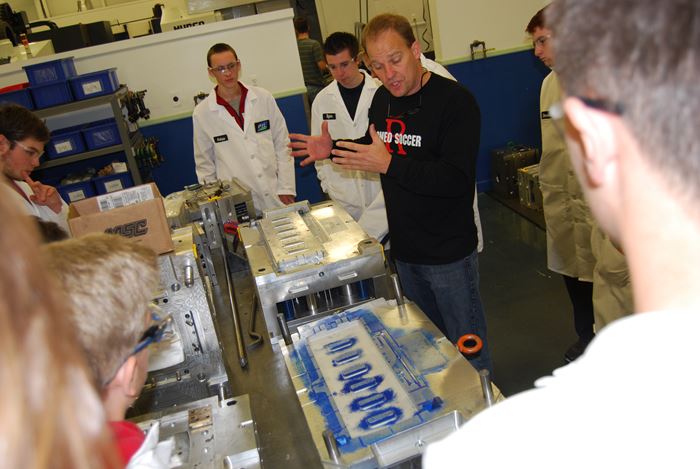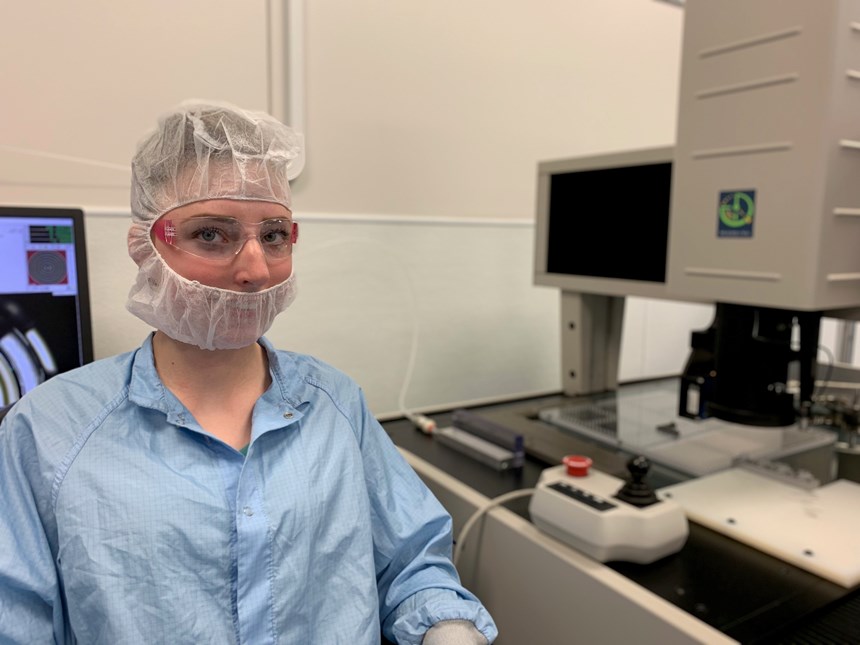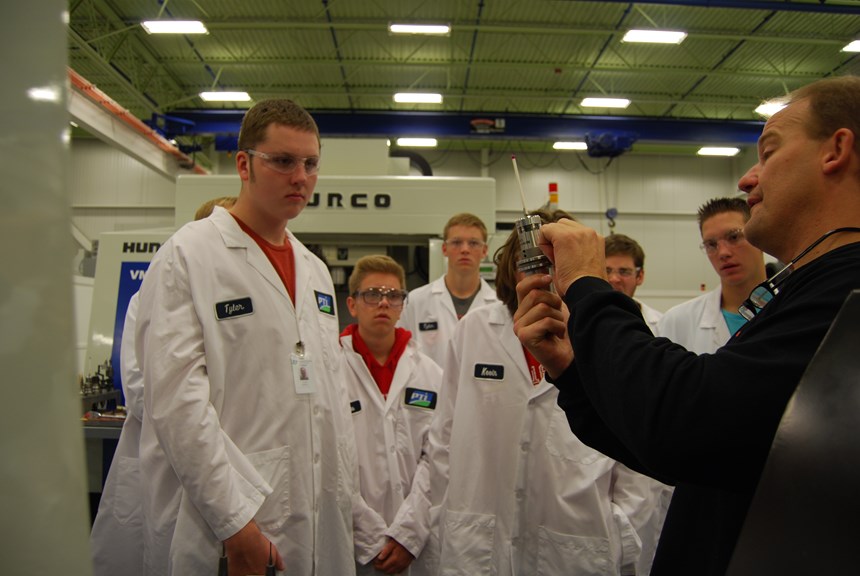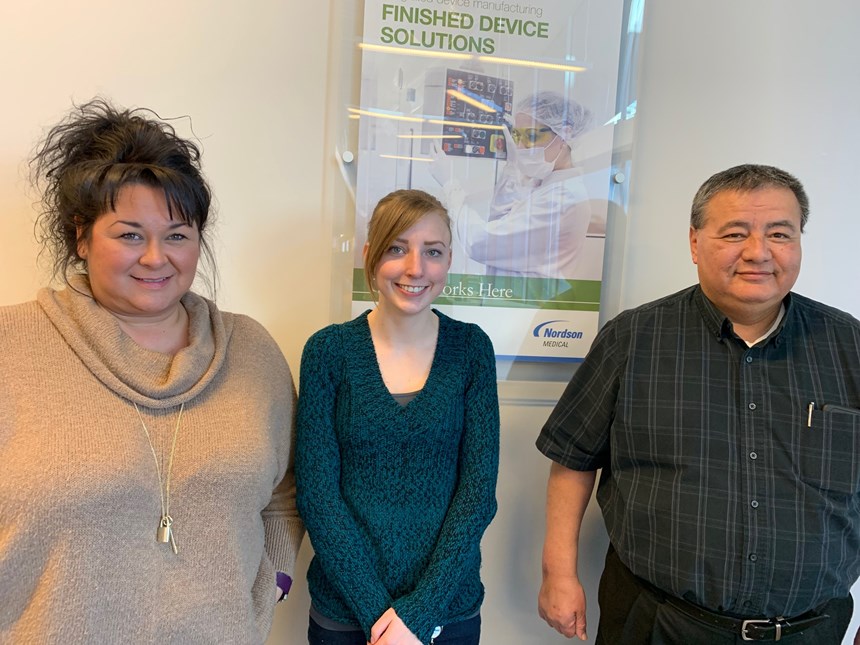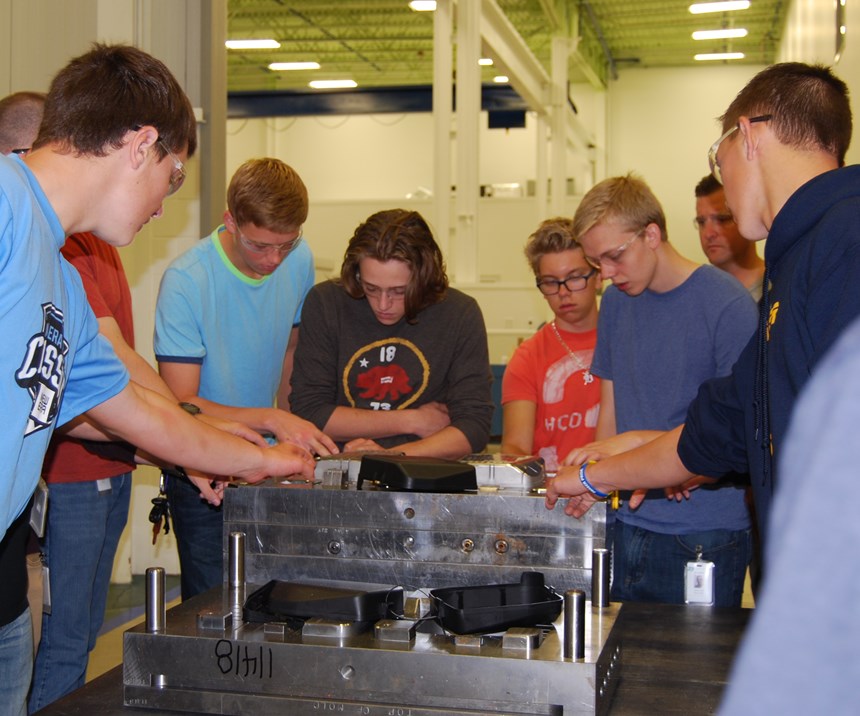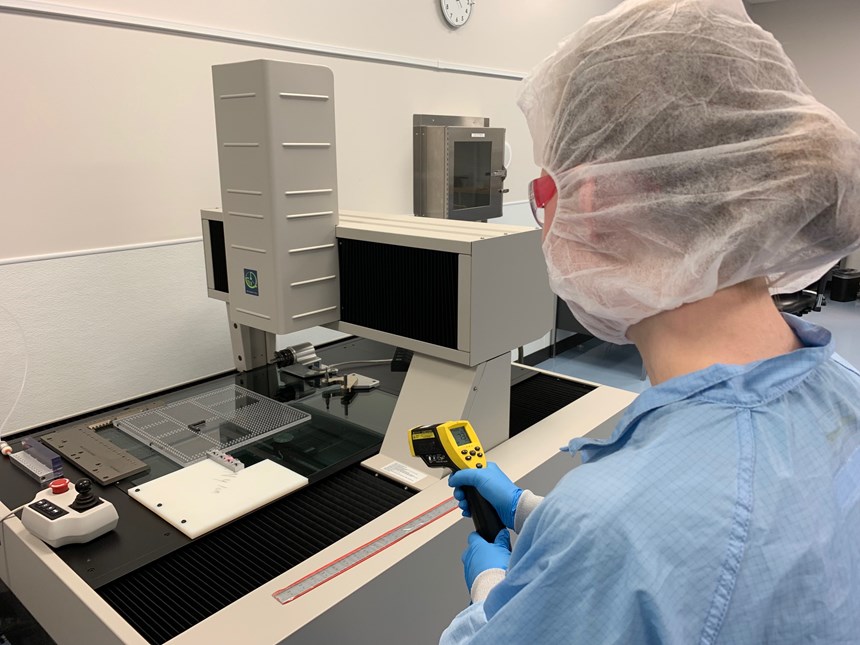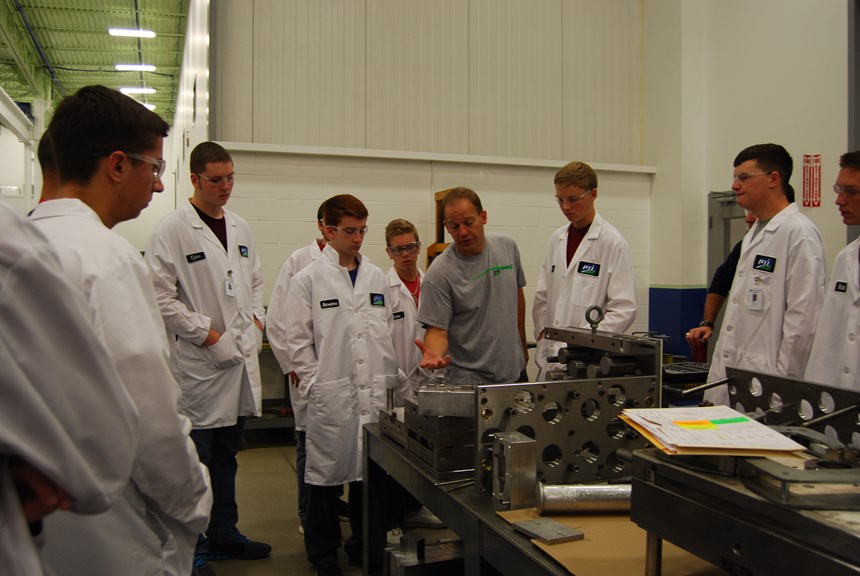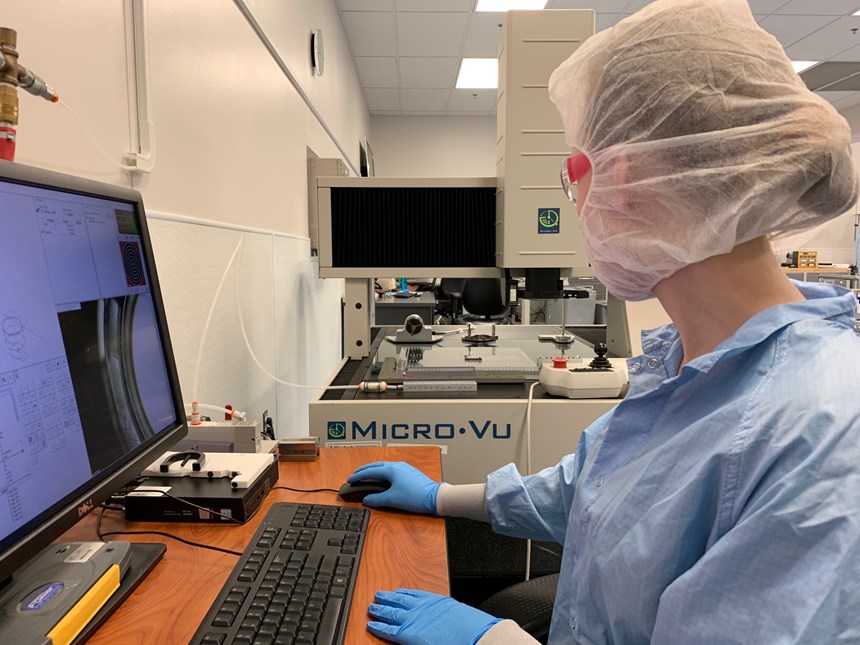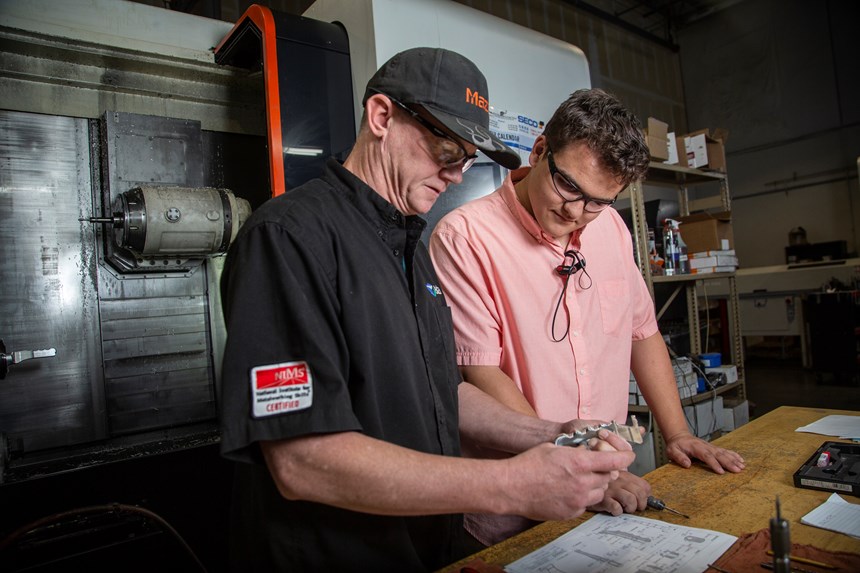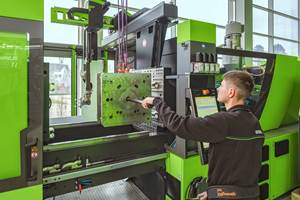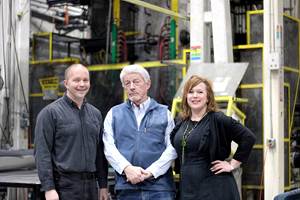Creating Tomorrow’s Workers Today
Plastics processors are increasingly taking matters into their own hands when it comes to bridging the yawning skills gap, drawing a sharpened focus on high schoolers. Could Switzerland’s apprentice system provide a model?
Nearly four decades ago while he was still in college, Noel Ginsburg started the injection molding business Intertech Plastics Inc. in Denver, Colo. Many things changed about molding over the years but even from those earliest days, Ginsburg recalls one familiar challenge.
“Whether we had 12 employees or 300,” Ginsburg says, “we never could find the skilled talent we needed to fill good jobs.” Just as the staffing issue never went away, neither did Ginsburg’s efforts to address it. After various initiatives over the years on his own and in conjunction with local and federal government, Ginsburg founded CareerWise Colorado in 2016, stepping away from Intertech to become CEO and chairman of this organization that is building a new apprenticeship program.
The genesis for the initiative was a 2015 trip taken by Ginsburg and various other officials, including then Colorado Governor John Hickenlooper, to Switzerland for a first-hand assessment of that country’s all-encompassing apprenticeship program in which 70 percent of high school students participate. Ginsburg thought the Swiss model could be “transformational” to Colorado’s, and maybe America’s, education system. “I really saw it as a solution that not only would solve the workforce issues that I have in manufacturing, but it could be the answer in banking, insurance, marketing…,” Ginsburg says. “[The apprenticeship program] literally drives their whole economy.”
CareerWise Coloardo takes juniors and seniors in high school and gives them three years of intensive on-the-job training during school hours; training that is aligned with their class room instruction and that targets critical occupations businesses need to fill, according to a CareerWise spokesperson. Over those three years, the students are paid; they’re developing the beginnings of a professional network; they’re often collecting college-level credits; and for many, when they finish, they’ll be in line for a position with the company, with many of those businesses willing to help pay for college tuition while the former apprentice pursues a degree. Ginsburg describes CareerWise as an “intermediary” connecting schools, students and companies.
“CareerWise provides the support for businesses,” Ginsburg says. “We provide the linkages to the school—the marketplace to connect the students to job opportunities as apprentices.” Ginsburg appreciates how important the support and guidance CareerWise provides is, reflecting on Intertech’s attempts at managing its own apprenticeship programs.
“I can tell you,” Ginsburg says, “Intertech had tried to do apprenticeships for years with little success. I mean, we really didn’t know what we were doing.”
Building Your Own Talent Pipeline
Back in 2014, Mark Rathbone, CEO and owner of custom injection molder PTI Engineered Plastics (Macomb, Mich.), perceived a critical problem for his business going forward; an issue his company would have to directly address. “[Mark] figured that if he was going to have any workforce at all in the future, he was going to have to bring it along,” explains Cheryl Kaiser, marketing manager at PTI. “So that really was the motivator for the academy, to fill PTI’s pipeline.”
The “academy” is the PTI Technical Academy, created in the fall of 2014 in conjunction with educators, area schools and the local school district in Macomb. Fully funded by PTI, the program brings 10th through 12th graders from Macomb County into PTI where they are trained hands-on in everything from injection molding and shop safety to CNC programing and CAD design. PTI has taken feedback from students, teachers and administrators over the years, tweaking the program to best serve its participants. In its current form, the academy brings in students on Saturdays from 8 to noon over four weeks. The most recent graduating class, which completed the program in November 2018 had 15 students. When Plastics Technology spoke with PTI in late 2018, 11 students were already enrolled for the next session in the spring.
“We’ve had as low as four students and as high as 15,” Kaiser says. “15 students is really our sweet spot.” In the four years the program has run, 105 students have come through the academy. PTI has hired 13 students from the program for full-time or part-time positions, as well as a few internships.
An Apprenticeship Assist
Nordson Medical (Loveland, Colo.) Senior Tooling Engineer Henry Magallanes was impressed enough by a CareerWise Colorado presentation at Front Range Community College in Fort Collins, Colo. that he approached the speaker afterwards. “I said, ‘Hey, we want to be a part of this,’” Magallanes recalls. “So that’s kind of how it all started and morphed into a full-blown apprenticeship program.”
Nordson Medical moved into a new 115,000-ft2 facility, featuring cleanroom assembly and molding, in 2015. Before CareerWise, Magallanes says that apart from engineering interns from nearby Colorado State University, Nordson developed some talent by assessing the aptitude of temp hires in areas like assembly, choosing the best-performing of those individuals to take on greater responsibility. The company’s HR department was aware of Magallanes’ past work with workforce development and in late 2015 asked for his help in starting a more formal program. “[HR] knew I was involved with apprenticeship programs,” Magallanes says, “but I’d never started one.” CareerWise helped change that.
“We’re so lean here that it’s really hard to do a full apprenticeship program,” Magallanes says. “When we were presented CareerWise, they take a lot of that administrative work out of it—tons of HR support and those kinds of things. That was the part of the equation that we just couldn’t do—we’re too lean—so it became a really good marriage.”
Nordson developed a plan to bring in two apprentices initially and have them cycle through four positions in production: process technician, set-up technician, quality technician and maintenance technician. Nordson has plans to bring on two more apprentices, and it has expanded the fields available to include material handling and product distribution/shipping.
Taking a Chance
Today, Matt Kempt is the detail department supervisor at PTI Engineered Plastics, but back in 2016, he was still a high school student when a teacher opened his eyes to a new program. “I was in welding class,” Kempt recalls, “and the teacher sat us all down one morning and gave us the dog-and-pony show on the PTI Academy.”
Kempt was familiar with manufacturing having actually worked at a shop down the road from PTI, starting out sweeping floors when he was 16. That personal experience built on familiarity gleaned at home from his own family’s history with industry. “My father worked in shops when he was younger and my grandfather, when he immigrated here, became a diemaker himself, and made a pretty good living for himself here,” Kempt says.
Currently a senior at Colorado Early Colleges High School in Fort Collins, Colo. Kaylee Waldo works within the quality department at Nordson Medical, thanks to a tip from her sister. “CareerWise came in one night and told our high school about themselves and what they want to do,” Waldo explains. “My sister went to that meeting and then told me about it afterwards.”
At this time, Waldo works two full days at Nordson—Tuesdays and Thursdays—coming in for a half day on Saturdays while still continuing her education. She has already completed her high school courses and will be finishing her associates degree this spring. At this point, Waldo is wrapping up college-level prerequisite courses with no firm plans for a bachelor’s degree path, but she does have interest in enrolling in a four-year college. She is 18 months in to the 36-month commitment to Nordson, learning about the stringent inspection requirements of the quality department at an ISO 9001 and ISO 13485 medical injection molding facility.
“I honestly didn’t know what to expect,” Waldo says of molding and manufacturing. Her only previous paid work experience had been in fast food. “I had heard certain things about manufacturing, like the environment is sometimes not safe, but it is very safe here. I feel very safe and it is very clean.”
Working as a quality inspector, Waldo’s day-to-day job entails examining parts to ensure they fit Nordson’s criteria. Asked her course of action if she sees an out-of-spec part, Waldo effortlessly shifts into the shop talk of a seasoned molding veteran. “I walk over to the IMM and the PT and I tell him what is going on,” Waldo says, sliding into abbreviations for injection molding machine and process technician. “The PT says how he’s going to fix it, and then I write it up.”
Waldo was a fast student according to Jennifer Angove, the associate quality control specialist at Nordson and her trainer. “We started from ground zero because she didn’t know prints or anything like that,” Angove says. “She’s a smart kid; she listens and asks questions.” Angove explains the key has been hands-on experience. Working within the quality lab at Nordson, gowning up, and running the coordinate measuring machine (CMM), in some aspects she’s already ahead of college engineering students learning about quality management systems in a class room. “Jennifer doesn’t have to babysit her or anything like that,” Magallanes says.
Reaching a Tipping Point
Reflective of the manufacturing industries they were born from, CareerWise Colorado and the PTI Technical academy are subject to continuous improvement. When Plastics Technology spoke to Ginsburg in late 2018, CareerWise had been operational for a little over two years and its second cohort of apprentices were completing their fall semester, with business and students being recruited for the 2019 fall cohort. The program was active in seven school districts in Colorado, with more than 50 high schools participating. Approximately 130 companies throughout the state had signed on with roughly 450 apprentices expected to be in the program.
The growth in only a few years is impressive, but the current participation levels just scratch the surface of the program’s vision for itself over the next 10 years. “Our goal is to reach 20,000 apprentices within the system within a decade,” Ginsburg says, “that’s about 10 percent of our graduating seniors in the state of Colorado.” A far cry from the 70 percent participation rate in Switzerland, but at that level Ginsburg believes CareerWise could reach a critical mass. “We do think the tipping point is around 5000 to 10,000 apprentices,” Ginsburg explains.
At PTI, tweaks to its program have centered on the curriculum and the format, according to Kaiser. The length has shifted over the years from 13 weeks, to nine to the current four. At that level, the school district told PTI it could guarantee a full academy three times a year. “For students to commit to nine weeks—nine Saturdays—is pretty hard,” Kaiser says, “ but we didn’t have any fall out. This time the academy met four weeks for five hours and all of our students graduated.”
Open Your Mind to Manufacturing
As much as these programs are helping manufacturers build a bridge to their future workforce, they are also giving young adults a different path forward. “This is definitely an avenue for someone who may not be college bound,” PTI’s Kaiser says. “That is really what the owner was thinking about when he first did this.”
PTI Academy graduate and current PTI employee Kempt says he “kind of looked at college,” but also freely admits that “my other classes weren’t as successful as my shop classes.” PTI Academy gave him another option. “So I figured why not,” Kempt says, “machining, manufacturing, is a great trade to be in. There’s money to be made and you don’t owe a single dime to a college in debt. That was a big appeal to me.”
Knowing what he knows now, which reinforced his personal family experience with manufacturing, Kempt said he would freely offer guidance to today’s high schoolers. “Honestly, what I would tell kids if I were to go back to my high school is open your mind to [manufacturing]; it is an option,” Kempt says. “It isn’t for everybody, so if it doesn’t work out for you, do not be discouraged by that, but college isn’t for everybody either.”Related Content
Mold-Change Time Targeted with Training, Technology
Engel is offering technology and training to molders to help them optimize their mold-changing process.
Read MoreWittmann Delivers Injection Molding Workcell to Alabama Community College
Southern Union State Community College (SUSCC) installed the Wittmann SmartPower120 molding machine with an integrated robot, temperature control unit (TCU) and dryer to support its plastics education program.
Read MoreBoise State Team Wins Circular Plastics Challenge Focused On PET Recovery
NPE2024: The competition is a collaboration between Hillenbrand, Net Impact and Coca Cola.
Read MoreBlow Molder Confer Plastics Celebrates Golden Anniversary & the ‘American Dream’
This family-run firm fills a specialized niche with a culture of innovation and environmental stewardship that realizes the dreams of its founders, its employees and its customers.
Read MoreRead Next
See Recyclers Close the Loop on Trade Show Production Scrap at NPE2024
A collaboration between show organizer PLASTICS, recycler CPR and size reduction experts WEIMA and Conair recovered and recycled all production scrap at NPE2024.
Read MorePeople 4.0 – How to Get Buy-In from Your Staff for Industry 4.0 Systems
Implementing a production monitoring system as the foundation of a ‘smart factory’ is about integrating people with new technology as much as it is about integrating machines and computers. Here are tips from a company that has gone through the process.
Read MoreFor PLASTICS' CEO Seaholm, NPE to Shine Light on Sustainability Successes
With advocacy, communication and sustainability as three main pillars, Seaholm leads a trade association to NPE that ‘is more active today than we have ever been.’
Read More

